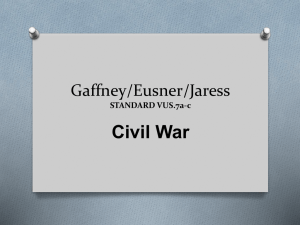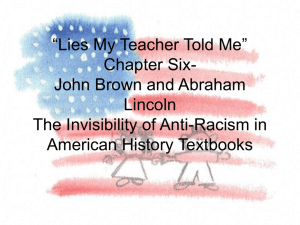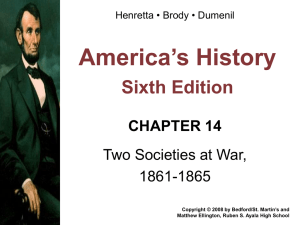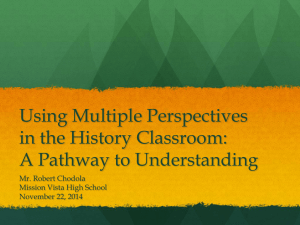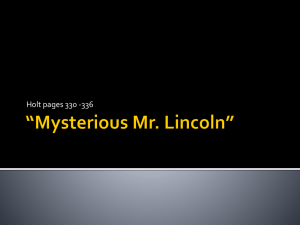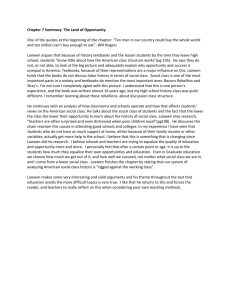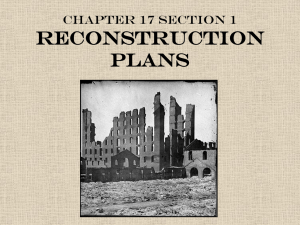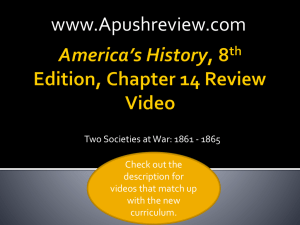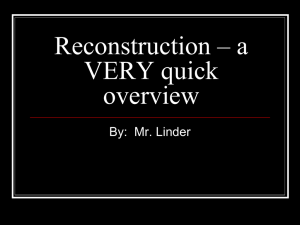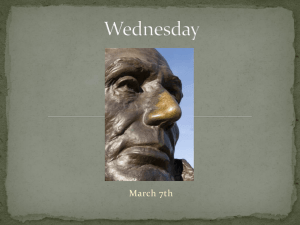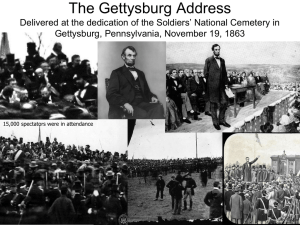Our Loewen Project
advertisement
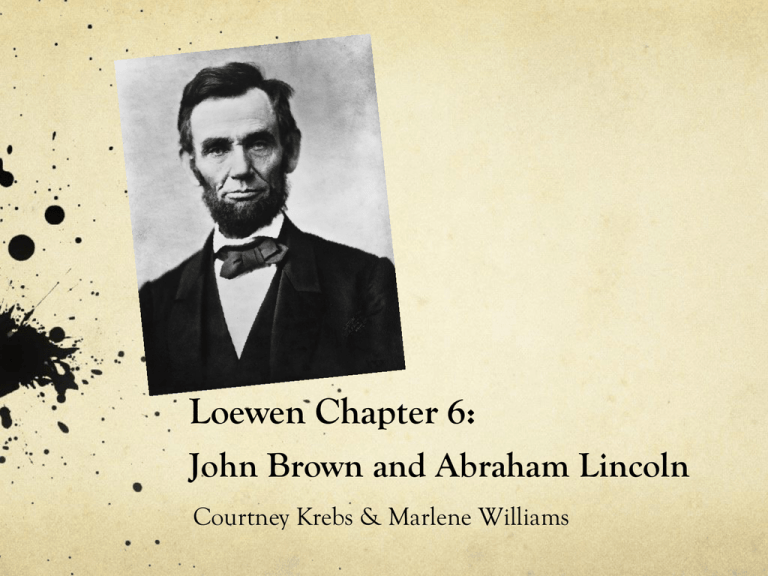
Loewen Chapter 6: John Brown and Abraham Lincoln Courtney Krebs & Marlene Williams Textbooks American History A Survey 10th Edition By Alan Brinkley 1999 America: The People And the Dream Volume I: The Early Years By Divine, Breen, Fredrickson & Williams 1992 A Call to Freedom Stuckey Salvucci John Brown Loewen’s Argument Treatment of Brown has changed in American history textbooks over time. Perfectly Sane Insane Regained Some Sanity Pottawatomie, Kansas & Harpers Ferry, Virginia Eight books negative, Nine books openly hostile Textbooks American History a Survey “a few began to advocate violence” (420) Brown described as a “fervent opponent” to slavery and” considered himself an instrument of God’s will to destroy slavery” (451) Windell Phillips and Ralph Waldo began to glorify Brown as a saint and martyr to the the North. American: P&D “a militant abolitionist” Brown believed that God had called him to carry out a war against slavery. (428) Discusses the uproar it led to in the states and cautions and violence that spread Congressman Brooks (antislavery) condemned the south for spreading slavery West Picture of John Brown in positive light he is going to jail and stops to kiss a little black baby by the door---caption explains that this is an illustration of how some northerners and slaves felt sympathy toward Brown (432) Abraham Lincoln Loewen’s Argument Textbooks describe Abraham Lincoln with sympathy, but they also minimize his ideas, especially on the subject of race. Most of our textbooks say nothing about Lincoln’s internal debate about slavery. If they did show it, students would see that speakers modify their ideas to appease and appeal to different audiences, so we cannot simply take their statements literally. Textbooks American History a Survey “radical enough to please antislavery faction…but conservative enough to satisfy many ex-Whigs” (462) “Conservatives favored a slower, more gradual, and, they believed, less disruptive process for ending slavery; in the beginning, at least, they had the support of the president. Despite Lincoln’s cautious view of emancipation momentum began to gather behind it early in the war.” (478) “President Lincoln’s sympathies lay with the Moderates and Conservatives of his party… …Lincoln was not uninterested in the fate of the freedmen, but he was willing to defer questions about their future for the sake of rapid reunification... …hoped to to extend suffrage to those blacks who were educated, owned property, and had served in the Union army… …The circumstances of Lincoln's death earned him immediate martyrdom.” (511) America P&D Page 431 describes Lincoln as a skillful lawyer Lincoln Douglas debate Lincoln did not favor ending slavery in existing states but wanted to stop its expansion. Thought of slavery as amoral issue Page 456 & 626-7 Emancipation Proclamation opposed slavery but was not an abolitionist did not want to anger the slave states believed in gradual emancipation by states voluntarily did not think free blacks and whites could get along- so tried to find other countries public pressure to end slavery did not want it to seem as an act of desperation for the union made clear that “slaves were being freed to help the war not for humanitarian reasons” “the cause of freedom for blacks and the cause of restoring the union had finally become one and the same. Despite his earlier concerns, president Lincoln would be remembered throughout history as the “great emancipator”.” Gettysburg Address Loewen Lincoln’s three paragraphs at Gettysburg comprise one of the most important speeches ever giving in America and take up only a fourth of a page in the textbooks that include them. Five books do not even mention the speech while others only provide the last sentence. Textbooks American History does not contain any mention of the Gettysburg Address while America P&D gives the entire text along with an introduction and discussion questions. A Call to Freedom also contains the entire text along with an explanation of the importance of the speech. Lincoln’s Second Inaugural Address Loewen Even worse than the treatment of the Gettysburg Address is Lincoln’s Second Inaugural Address. Only 1 text includes most of the speech, 7 restrict quotation to the final phrase, and ten ignore the speech altogether. Important because explains the reasons and some impacts of the Civil War. Textbooks American History has a few words from the speech when speaking of the war… “all knew”, he said, that slavery “was somehow the cause of the war””. America P&D contains the entirety of the speech along with discussion questions. Conclusion Loewen argues that “Yet, we in America, whose antiracist idealist are admired around the globe, seem to have lost these men and women as heroes. Our textbooks need to present them in such a way that we might again value our own idealism.” The textbooks we studied mostly follow Loewen’s argument. Some leave out important historical primary sources and portray Brown as probably crazy. Although Lincoln’s personal views on slavery are debatable, these textbooks do not talk about his views or internal debate. Our overall impression is that textbooks do not make a point to mention the strong antiracist sentiment that existed in America during the civil war.
